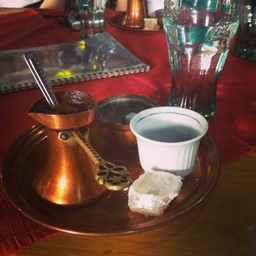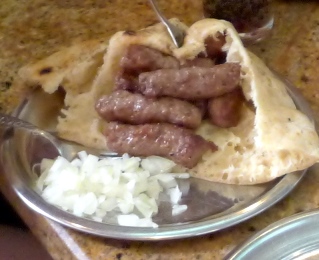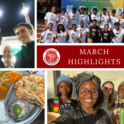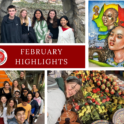StoriesBack to Stories
Bosnian Food: “Bosanska Hrana”

By Rachael Phillips, YES Abroad Bosnia and Herzegovina, 2014-2015
One of my first impressions of Bosnia and Herzegovina and Bosnian people is how much they love and appreciate their food. Most of our YES Abroad host families make homemade juices and teas, as well as a multi-course lunch or dinner (the main meal of the day is usually eaten around 3 p.m.). Eating is often more formal than it is in my family at home in the U.S., meaning Bosnians like to sit down and eat. They make the table and set out multiple courses of food, then sit and eat together. It is a reason for everyone to talk together, regardless of age or first language.
Bosnian food is different from typical American food, but it is on the whole incredibly delicious. One traditional food that is best known in Bosnia and Herzegovina and around the world is ćevapi. Ćevapi is actually just a type of sausage, but served with a doughy bread pocket and a liberal amount of onions, it makes an amazing dish.
Other Bosnian food that I’ve enjoyed so far, such as a delicious soup made with beans, potatoes, spinach, and other veggies, was made by my host grandmother. Nearly every meal is served with many slices of bread and raw vegetables, which are usually sprinkled with salt. While at first I didn't understand this, I've now realized that the salt can bring out the flavor of the vegetables. I’ve also enjoyed a not-so-typical for Americans afternoon snack of grilled sausage, baked pepper, and plain bread.
Finally, when talking about food I have to mention Bosnian coffee -- kahva. Kahva is usually served as it is in the picture above, in a traditional brass or copper pot, with sugar cubes that you can add to your cup as you please. The white bar in the front is Turkish delight (“rahat lokum”), a sweet candy served specially in the traditional, Ottoman-influenced cafes and restaurants. Bosnian coffee can be very bitter at first, but with a little sugar, I find it delicious.
I usually drink kahva when I get home each day, with my host mom and grandmother. Drinking kahva is a social occasion. Today most of my household was out of town, so my host mom waited for me to get home to have a cup. She said that she didn't like drinking coffee alone, and I understand why. Drinking kahva with her was a way for us to take a break, sit down, and talk about our days. Food and drink in Bosnia is significant, and not just because it's delicious.






